宁夏吴忠市青铜峡市高级中学2021届高三上学期开学考试英语试题
宁夏青铜峡市高级中学2021届高三英语上学期第一次月考试题.doc

宁夏青铜峡市高级中学2021届高三英语上学期第一次月考试题第Ⅰ卷 (选择题)第一部分:听力理解(共两节。
满分30分)做题时,先将答案标在试卷上。
录音内容结束后,你将有两分钟的时间将试卷上的答案转涂到答题卡上。
第一节 (共5小题:每小题1.5分,满分7.5分)听下面5段对话。
每段对话后有一个小题,从题中所给的A、B、C三个选项中选出最佳选项,并标在试卷的相应位置。
听完每段对话后,你都有10秒钟的时间来回答有关小题和阅读下一小题。
每段对话仅读一遍。
1.How did Mary travel this morning?A. By taxi .B. By bus .C. On foot.2. What can we learn about the man?A. He used to live in the countryside.B. He used to live in a very old house.C. He livs near the school now.3. Why is the man so sad about his future planning?A. He wants to be a singer but he cannot.B.The customers in the resturant are so rude.C. He is afraid that he can’t pass the examinations.4. When does the bank close on Saturday?A. At 1:00 p.mB. At3:00 p.mC. At 4:00 p.m5. What does tha man suggest?A. Taking a walk .B. Writing a report.C.Going to the library.第二节(共15小题:每小题1.5分,满分22.5分)听下面5段对话或独白。
高三英语上学期开学考试试题 2(共32页)
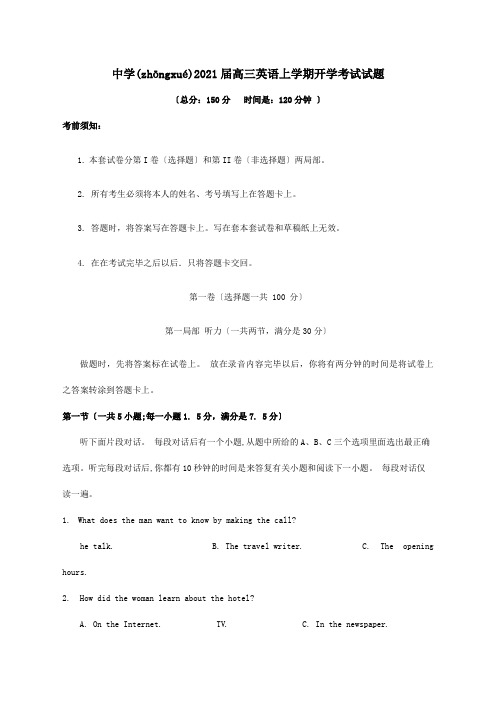
中学(zhōngxué)2021届高三英语上学期开学考试试题〔总分:150分时间是:120分钟〕考前须知:1.本套试卷分第I卷〔选择题〕和第II卷〔非选择题〕两局部。
2. 所有考生必须将本人的姓名、考号填写上在答题卡上。
3. 答题时,将答案写在答题卡上。
写在套本套试卷和草稿纸上无效。
4. 在在考试完毕之后以后.只将答题卡交回。
第一卷〔选择题一共 100 分〕第一局部听力〔一共两节,满分是30分〕做题时,先将答案标在试卷上。
放在录音内容完毕以后,你将有两分钟的时间是将试卷上之答案转涂到答题卡上。
第一节〔一共5小题;每一小题1. 5分,满分是7. 5分〕听下面片段对话。
每段对话后有一个小题,从题中所给的A、B、C三个选项里面选出最正确选项。
听完每段对话后,你都有10秒钟的时间是来答复有关小题和阅读下一小题。
每段对话仅读一遍。
1. What does the man want to know by making the call?he talk. B. The travel writer. C. The opening hours.2. How did the woman learn about the hotel?A. On the Internet. TV. C. In the newspaper.3. When can the woman return home?A. At 10:15.B. At 10:30.C. At 10:45.4. What is the woman probably?A. A coach.B. A nurse.C. An athlete.5. How will the speakers travel?A. By plane.B. By train.C. By car.第二(dìèr)节〔一共15 小题,每一小题1.5 分,满分是22.5 分〕听下面 5 段对话或者独白。
高三英语上学期开学检测试题含解析 试题(共32页)

中学2021—2021学年高三上学期开学检测(jiǎn cè)英语试卷〔文理实验班、重点、特长班〕时间是:120分钟分值:150分第I卷选择题〔一共100分〕第一局部听力〔一共两节,满分是30分〕第一节〔一共5小题;每一小题1.5分,满分是7.5分〕听下面5段对话。
每段对话后有一个小题,从题中所给的A、B、C三个选项里面选出最正确选项,并标在试卷的相应位置。
听完每段对话后,你都有10秒钟的时间是来答复有关小题和阅读下一小题。
每段对话仅读一遍。
1. What is the probable relationship between the speakers?A. Teacher and student.B. Salesgirl and customer.C. Husband and wife.2. What does the man think of the woman's new house?A. Astonishing.B. Disappointing.C. Satisfying.3. What does the woman mean according to the conversation?A. The philosophy teacher is not so popular among his students.B. The classes given by the philosophy teacher are quite boring.C. The students are interested in the philosophy classes.4. What are the speakers mainly talking about?A. Watching TV.B. Buying a TV.C. Placing the TV.5. Why does the woman intend to phone Harry?A. Because Harry will join them in the bike ride.B. Because Harry is familiar with the places for cycling.C. Because Harry enjoys travelling.听第6段材料(cáiliào),答复第6至7题。
宁夏青铜峡市高级中学2020┄2021届高三第一次月考英语试题 Word版含答案
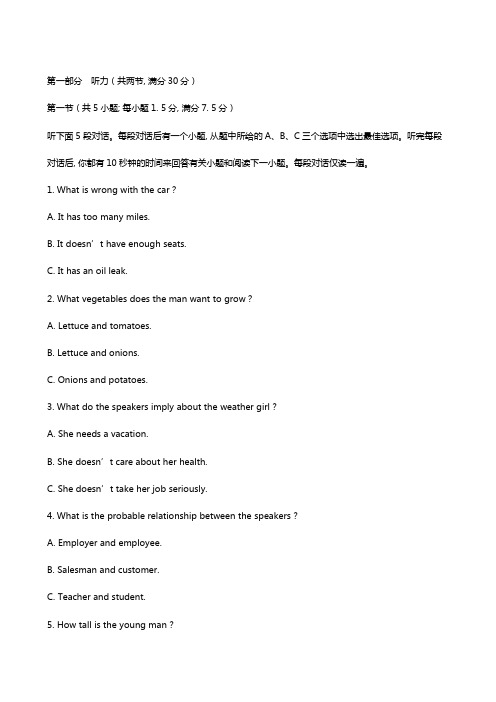
第一部分听力(共两节, 满分30分)第一节(共5小题; 每小题1. 5分, 满分7. 5分)听下面5段对话。
每段对话后有一个小题, 从题中所给的A、B、C三个选项中选出最佳选项。
听完每段对话后, 你都有10秒钟的时间来回答有关小题和阅读下一小题。
每段对话仅读一遍。
1. What is wrong with the car?A. It has too many miles.B. It doesn’t have enough seats.C. It has an oil leak.2. What vegetables does the man want to grow?A. Lettuce and tomatoes.B. Lettuce and onions.C. Onions and potatoes.3. What do the speakers imply about the weather girl?A. She needs a vacation.B. She doesn’t care about her health.C. She doesn’t t ake her job seriously.4. What is the probable relationship between the speakers?A. Employer and employee.B. Salesman and customer.C. Teacher and student.5. How tall is the young man?A. 4 feet, 6 inches.B. 5 feet, 3 inches.C. 6 feet, 2 inches.第二节(共15小题; 每小题1. 5分, 满分22. 5分)听下面5段对话或独白。
每段对话或独白后有几个小题, 从题中所给的A、B、C三个选项中选出最佳选项。
听每段对话或独白前, 你将有时间阅读各个小题, 每小题5秒钟; 听完后, 各小题将给出5秒钟的作答时间。
2021届宁夏青铜峡市高级中学高三年级上学期期中考试英语试题及答案
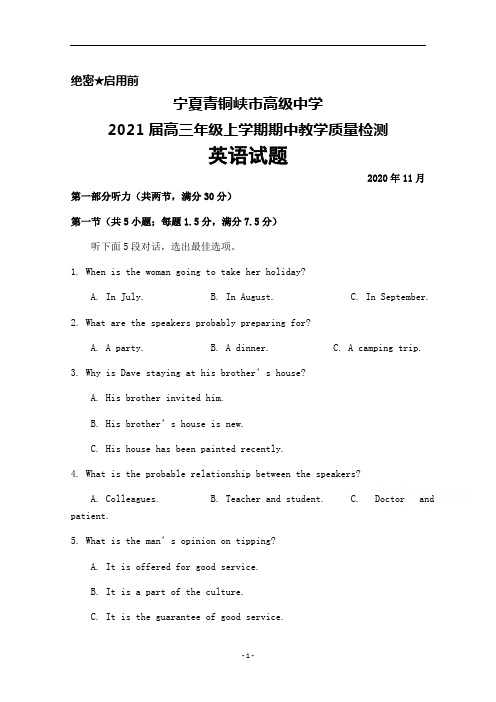
绝密★启用前宁夏青铜峡市高级中学2021届高三年级上学期期中教学质量检测英语试题2020年11月第一部分听力(共两节,满分30分)第一节(共5小题;每题1.5分,满分7.5分)听下面5段对话,选出最佳选项。
1. When is the woman going to take her holiday?A. In July.B. In August.C. In September.2. What are the speakers probably preparing for?A. A party.B. A dinner.C. A camping trip.3. Why is Dave staying at his brother’s house?A. His brother invited him.B. His brother’s house is new.C. His house has been painted recently.4. What is the probable relationship between the speakers?A. Colleagues.B. Teacher and student.C. Doctor and patient.5. What is the man’s opinion on tipping?A. It is offered for good service.B. It is a part of the culture.C. It is the guarantee of good service.第二节(共15小题;每题1.5分,满分22.5分)听下面一段对话,回答第6至第7两个小题。
6. What is the weather like now?A. Sunny.B. Foggy.C. Windy.7. Where are the speakers?A. At a hotel.B. At an airport.C. At a taxi station.听下面一段对话,回答第8至第10三个小题。
高三英语上学期入学考试试题 3(共21页)
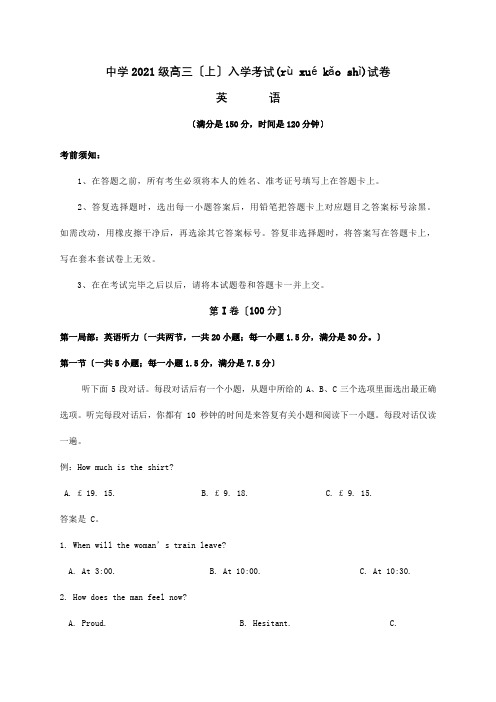
中学2021级高三〔上〕入学考试(rù xué kǎo shì)试卷英语〔满分是150分,时间是120分钟〕考前须知:1、在答题之前,所有考生必须将本人的姓名、准考证号填写上在答题卡上。
2、答复选择题时,选出每一小题答案后,用铅笔把答题卡上对应题目之答案标号涂黑。
如需改动,用橡皮擦干净后,再选涂其它答案标号。
答复非选择题时,将答案写在答题卡上,写在套本套试卷上无效。
3、在在考试完毕之后以后,请将本试题卷和答题卡一并上交。
第I卷〔100分〕第一局部:英语听力〔一共两节,一共20小题;每一小题1.5分,满分是30分。
〕第一节〔一共5小题;每一小题1.5分,满分是7.5分〕听下面5段对话。
每段对话后有一个小题,从题中所给的A、B、C三个选项里面选出最正确选项。
听完每段对话后,你都有10秒钟的时间是来答复有关小题和阅读下一小题。
每段对话仅读一遍。
例:How much is the shirt?A. £ 19. 15.B. £ 9. 18.C. £ 9. 15.答案是 C。
1. When will the woman’s train leave?A. At 3:00.B. At 10:00.C. At 10:30.2. How does the man feel now?A. Proud.B. Hesitant.C.Confident.3. What does the man ask the woman to do?A. Buy a glass.B. Attend a conference.C. Pick out a doll.4. Where will the man go tomorrow?A. To the Blue Sky Restaurant.B. To the Blue Bay Restaurant.C. To the Blue Ocean Restaurant.5. What are the two speakers talking about?A. A redecorated room.B. A new library.C. An art exhibition.第二节〔一共15小题;每一小(yī xiǎo)题1.5分,满分是22.5分〕听下面5段对话或者独白。
宁夏青铜峡市高级中学2021-2022学年高二上学期开学考试英语试题
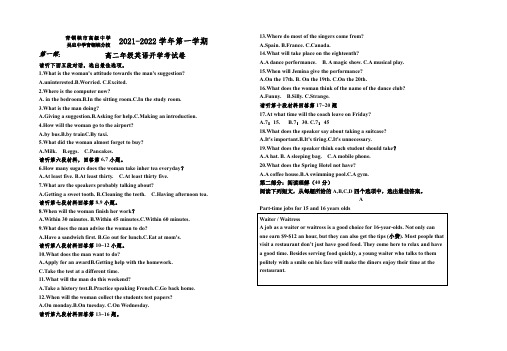
第一部分:听力(30分) 请听下面五段对话,选出最佳选项。
1.What is the woman's attitude towards the man's suggestion? A.uninterested.B.Worried. C.Excited.2.Where is the computer now?A. in the bedroom.B.In the sitting room.C.In the study room. 3.What is the man doing?A.Giving a suggestion.B.Asking for help.C.Making an introduction. 4.How will the woman go to the airport? A.by bus.B.by trainC.By taxi.5.What did the woman almost forget to buy? k. B.eggs. C.Pancakes. 请听第六段材料,回答第6,7小题。
6.How many sugars does the woman take inher tea everyday ? A.At least five. B.At least thirty. C.At least thirty five.7.What are the speakers probably talking about?A.Getting a sweet tooth.B.Cleaning the teeth.C.Having afternoon tea. 请听第七段材料回答第8,9小题。
8.When will the woman finish her work ?A.Within 30 minutes.B.Within 45 minutes.C.Within 60 minutes. 9.What does the man advise the woman to do?A.Have a sandwich first.B.Go out for lunch.C.Eat at mom's. 请听第八段材料回答第10~12小题。
2021届宁夏吴忠高级中学高三英语第一次联考试卷及答案解析
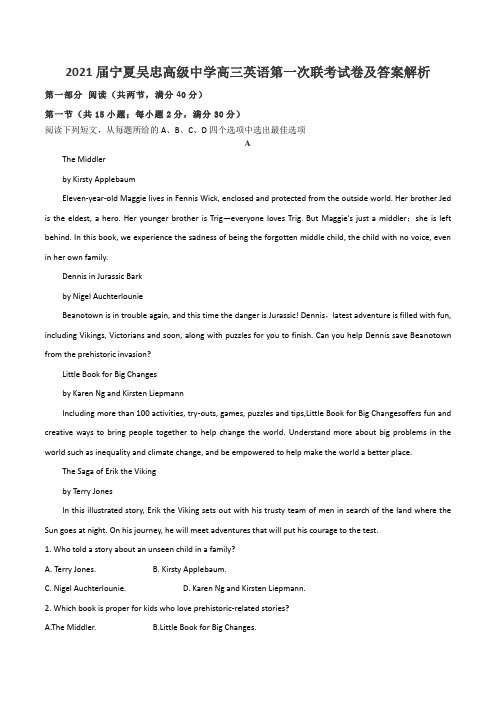
2021届宁夏吴忠高级中学高三英语第一次联考试卷及答案解析第一部分阅读(共两节,满分40分)第一节(共15小题;每小题2分,满分30分)阅读下列短文,从每题所给的A、B、C、D四个选项中选出最佳选项AThe Middlerby Kirsty ApplebaumEleven-year-old Maggie lives in Fennis Wick, enclosed and protected from the outside world. Her brother Jed is the eldest, a hero. Her younger brother is Trig—everyone loves Trig. But Maggie's just a middler;she is left behind. In this book, we experience the sadness of being the forgotten middle child, the child with no voice, even in her own family.Dennis in Jurassic Barkby Nigel AuchterlounieBeanotown is in trouble again, and this time the danger is Jurassic! Dennis,latest adventure is filled with fun, including Vikings, Victorians and soon, along with puzzles for you to finish. Can you help Dennis save Beanotown from the prehistoric invasion?Little Book for Big Changesby Karen Ng and Kirsten LiepmannIncluding more than 100 activities, try-outs, games, puzzles and tips,Little Book for Big Changesoffers fun and creative ways to bring people together to help change the world. Understand more about big problems in the world such as inequality and climate change, and be empowered to help make the world a better place.The Saga of Erik the Vikingby Terry JonesIn this illustrated story, Erik the Viking sets out with his trusty team of men in search of the land where the Sun goes at night. On his journey, he will meet adventures that will put his courage to the test.1. Who told a story about an unseen child in a family?A. Terry Jones.B. Kirsty Applebaum.C. Nigel Auchterlounie.D. Karen Ng and Kirsten Liepmann.2. Which book is proper for kids who love prehistoric-related stories?A.The Middler.B.Little Book for Big Changes.C.Dennis in Jurassic Bark.D.The Saga of Erik the Viking.3. What is special aboutLittle Book for Big Changes"!A. It is about two people.B. It is an adventure book.C. It has picturesinside to help kids read.D. It teaches kids to care for the world.BLearning to say “yes, and”When I first heard about the improvisation (即兴交流) class, I was hesitating. As a quiet and shy girl, I feared improvising in front of strangers. However,I knew I wanted to work as a science communicator after finishing my Ph.D., so it seemed like a perfect opportunity to learn how to speak and communicate with others effectively. I signed up, knowing the experience would give me help.During our first class, we learned an important concept of improvisation: “yes, and.” It means that, as improvisers, we’d better accept what fellow performers say. If someone says that rhinos (犀牛) are librarians, for example, then rhinos are librarians. We do not question the logic; we say “yes” and then continue with the scene as if nothing is wrong.The first few scenes were hard, but as weeks turned into months, I became more comfortable andeven started to enjoy our classes. I became better at listening, relating to my conversation partners, and communicating clearly in the moment. Once when I was giving a presentation about my science, an audience member surprised me with a question that didn’t grow out of the information I’d presented. Instead of getting confused and nervous, I took the “yes, and” approach—accepting the question and letting my mind focus on why it was asked. That helped me find an appropriate answer. I got pretty excited about it.The benefits of improvisation go beyond communication. Before attending the class, I would get stuck when my experiments produced unexpected data, thinking that I had made a mistake. But now, instead of getting discouraged, I will stay open to the possibility that the results are real, keep exploring the data and end up identifying a new type of cell—one that isn’t behaving as expected.I think all scientists can benefit from this lesson. If the data say rhinos are librarians, then it’s worth findingout whether rhinos are, in fact, librarians. As scientists, our job isn’t to challenge data that support a preconceived (先入为主的) story, but to say “yes, and.”4. Why did the author attend the improvisation class?A. To get a different experience.B. To finish her Ph.D. at university.C. To give up her job as a science communicator.D. To improve her speaking and communicating ability.5. What was the author’s change after attending the improvisation class?A. She formed her own idea quickly.B. She came up with lots of creative responses.C. She paid more attention to the logic of answers.D. She became a good listener before giving an opinion.6. The author mentions applying the “yes, and” approach to her scientific experiments to ______.A. explain the process of using the methodB. prove the benefits of the improvisation classC. share her own research experiences with readersD. attract fellow scientists to attend the improvisation class7. What can be inferred about scientists from the last paragraph?A. They should attend the improvisation class.B. They should question all preconceived ideas.C. They should carry on research by admitting earlier data.D. They should try to improve their professional knowledge.CAlaska—The American city Anchorage is recovering from a powerful earthquake Friday that damaged public buildings, homes and roads.The 7.0 earthquake caused buildings to slake. But there have been no reports of deaths, serious injuries or damage. Officials say the quake has not affected transportation of food and her supplies. “The ships are coming in on schedule, the supply lines are at this point working well,” the government told reporters Sunday.The Glenn Highway was probably the road hit hardest by the earthquake. It connects the state's largest city to other parts in the north. Traffic has been heavy and slow—moving since the quake. Drivers are being guided. Groups of workers are trying to rebuild areas where the quake left large holes in the road.People who are still nervous after the major quake have been more upset by more than 1, 700 aftershocks. “Anything that moves, you feel terrified”said David, whose home suffered structural(结构)damage, including a sunken foundation(地基). Actually, Alaska came up with strict building rules after a 9. 2 earthquake in 1964. That was the second most powerful earthquake on record.Government officials said a public health center promises that moneyfor medical treatment will continue to come. Mental healthy service(心理健康服务)is also available for people hurt by the disaster.Earthquake experts say there is a 4 percent chance of another 7. 0 earthquake or greater in the following week. "The chance is very small, but its not impossible, ” said the expert, Paul Caruso.8. What was the result of the earthquake?A. Buildings were damaged.B. Food supply was cut off.C. Many people were killedD. The ships could not come in.9. Why is the traffic slow on the Glenn Highway?A. Because small quakes hit the city.B. Because falling rocks are a danger.C. Because the highway is badly damaged.D. Because drivers are misled.10. What can you learn from Paul Caruso?A. Another greater earthquake is on the way.B. Chances still exists of another earthquake.C. It will be safe in the 1th week after the quake.D. There is no possibility for more quakes.11. Where can your possibly read the passage?A. Ina story book.B. In a travel journal.C. In a poster.D. In a newspaper.DAccording to a survey published by the American Institutes for Research last year, a total of 57 colleges were operating some form of CBE programs and about 85 percent of all the higher education officials said they were either designing a CBE program at their school or were considering doing so.Students in a CBE program choose a central field of study, just as they would at a traditional college or university. Yet instead of attending a series of classes led by professors or teaching assistants at schools, the students study online and direct themselves.CBE programs require students to show their understanding of a given set of sills Students must prove their mastery of skills that relate to their field of choice by taking related exams. Once they have met all the requirements of their study programs, the students will get their degrees.CBE programs have made use of many new technologies, especially internet and online media. This helps reduce barriers for nontraditional and other students by bringing higher education to them. And programs thatpermit students to work at their own speed may save students' money by reducing the time it takes for them to earn a degree.But some educators have concerns about the value of the education that CBE programs offer. Johann Neem atWesternWashingtonUniversityargues that the purpose of higher education is not simply to help students master certain skills. It should teach students how to think critically (批判性地) understand the subjects they are studying more deeply and see how they are connected to other subjects. Only that way can they put the knowledge to better use.He said, “You need to explore, think .. get shaken, have a conversation and struggle. Andthose things take time.”Instead of supporting CBE, he adds, policy makers and educators should look for ways to improve access and reduce costs for traditional higher education.12. How are CBE programs different from traditional college education?A. They require students to choose their subjects.B. They offer shorter curricula and are less expensive.C. They heavily rely on the information technologies.D. They allow students to take easier examinations.13. What can we learn from Johann Neem's words?A Free access to traditional education should be provided.B. Higher education just focuses on critical thinking skills.C. Students should spend longer time completing the degree courses.D. College students should be challenged to explore around their subjects.14. How does Johann Neem's attitude toward CBE programs?A. Supportive.B. Disapproving.C. Sympathetic.D. Uncaring.15. What is the author's purpose in writing the text?A. To press policy-makers to provide more affordable education.B. To show the disadvantages of the traditional college education.C. To introduce a new controversial trend in the higher education.D. To encourage educators to improve the quality of CBE programs.第二节(共5小题;每小题2分,满分10分)阅读下面短文,从短文后的选项中选出可以填入空白处的最佳选项。
- 1、下载文档前请自行甄别文档内容的完整性,平台不提供额外的编辑、内容补充、找答案等附加服务。
- 2、"仅部分预览"的文档,不可在线预览部分如存在完整性等问题,可反馈申请退款(可完整预览的文档不适用该条件!)。
- 3、如文档侵犯您的权益,请联系客服反馈,我们会尽快为您处理(人工客服工作时间:9:00-18:30)。
青铜峡高中2021届高三上学期开学考试英语试卷第一部分:听力(满分30分)第一节请听下面5段对话,选出最佳选项。
1. How did the man feel about the movie?A. Scared. B Amused. C Moved2. What did the woman do last night?A. She watched TV .B. She attended a concert.C. She went to the cinema.3. Where are the speakers probably?A. At the hairdresser’ s .B. At the jeweller’ s . C . At home .4. What do the speakers have in their own office?A. Some pens . B Some pencils . C. Some sharpeners.5. What are the speakers talking about?A. How to boil eggs. B Where to put the pan . C Who to do the washing-up .第二节请听第6段材料,回答第6、7题6. Where is the flat?A .Next to a school . B. Near a supermarket . C. Beside a park .7. What does the woman want to do?A. To sell a flat .B. To rent a flat.C. To buy a flat.第一部分: 请听第7段材料,回答第8至10题。
8. How does the woman sound?A. Strict.B. Ashamed.C. Annoyed.9. What do we know about Richard?A. He is always late for class.B. He listens to his iPod in classC. He makes phone calls in class10. What is the probable relationship between the speakers?A. Classmates.B. Couple.C. Colleagues.请听第8段材料,回答第11至13题11. Who is having a birthday on Saturday?A. Tom’ s sisterB. Tom ‘s cousinC. Tom12. What will the woman do next?A. Call her friendB. Go to the moviesC. Talk to her mother13. When will the man pick the woman up on Saturday?A. At 11: 00 pm.B. At 11: 30 pm . C .At midnight.请听第9段材料,回答第14至17题14. Where will the woman work for the first week?A. In the dining room. B In the manager’ s office. C. In the conference center.15. How long will the woman work every week?A. 42 hours .B. 35 hours .C. 30 hours.16. When will the woman get free from work?A. On Fridays. B .On Saturdays . C .On Sundays.17 Which meal can the woman have for free?A. Breakfast. B . Lunch. C .Supper.请听第10段材料,回答第18至20题18. Where will the winner of this competition go on a trip?A. In Pera.B. In Canada.C. In South Africa.19. What will the winner of the competition do during the trip?A. Visit a research center.B.Skate with some scientistsC. Study at a local university.20. What should competitors provide when they enter the competition?A. Their photographB. Their phoneC. Their email address第二部分:阅读理解(满分40分)阅读下列短文,从每题所给的A、B、C 和D四个选项中,选出最佳选项。
AJoin us for the opening of the schools ofthe future exhibition — eventThe year is 2035. A group of schoolchildren heads over to a garden for lunch and, after the break, teachers send lessons into headsets (头戴式耳机) worn by students. The wearable tech is able to read body signals to make sure the child is concentrating (全神贯注) and can differentiate the lessons according to how their young charge is getting along. It can also send a full progress assessment (评估) to the teacher.This is one picture of the future of school life, but how likely is it? Over the past five months, the Guardian Teacher Network has been exploring how schools might develop over the next twenty years and beyond. Our journalists have explored a series of topics from whether computers could replace teachers and how some libraries are breaking with tradition, to the rise of outdoor learning and the forest school revolution. One area that provides much food for thought is the future of school dinners. Journalist Matthew Jenkin has looked back at Jamie Oliver’s campaign against Turkey Twizzlers, deciding that the next hot topics include mealtimes and foods.We’re now bringing these ideas to life in an exciting exhibition, supported by Zurich Municipal, held at our offices in London. It is free to attend. We’ll be hearing from Liz Sproat, the head of education for Google across Europe, Middle East and Africa.We’d love for you to join us for a spot of future drinks and food.Date: Sunday 17 June 2018Time: 6:30 pm to 8:30 pmLocation: The Guardian, 90 York Way, London, N1 9GUCost: FreeSpeakers: Charles Leadbeater, author and education advisorMargaret Cox OBE, professor of information technology in education, King’s College LondonTom Sherrington, headteacher, Highbury Grove SchoolLiz Sproat, head of education, EMEA, Google21. What does the first paragraph describe?A. An exhibition program.B. A picture on the school wall.C. A possible future scene at school.D. A newly invented high-tech headset.22. What can we learn about the exhibition?A. It is being held by King’s College LondonB. It centres on the future of school life.C. It will be on show worldwide.D. It is hosted by Liz Sproat.23. What type of writing is this text?A. A travel guide.B. An announcement.C. A school year plan.D. An educational report.BThe Red Bicycle is a storybook about a bicycle’s journey from North America to the countryside in West Africa. The full name of the book is The Red Bicycle: The Extraordinary Story of One Ordinary Bicycle, and was written by Jude Isabella from Canada.Leo wants a bike, not just any bike but a red one. He makes money by doingpart-time jobs until he has enough money to buy it. He loves his new bike and names it Big Red. He rides Big Red everywhere for many years until he is finally too big for it. Because he has taken such good care of the bike, it looks almost new. He wants to givethe bike to someone who really needs it, and will love it the way he does. Leo learns about a charity that sends donated (捐赠的) bikes to people in Africa.When Big Red arrives in Africa, the bike finds a new owner, a young girl named Alisetta. She learns to ride Big Red and uses it to help her family on their farm. She also rides Big Red to the market to sell goods that her grandmother made. She earns money so her sister can go to school. Alisetta earns enough money to buy another bike. But while she is gone, Big Red is destroyed by a pig. A worker from a hospital then takes Big Red, repairs it, and turns it into an ambulance (救护车). Then, a young woman, named Haridata, uses the bike to bring sick people to the hospital.What a wonderful journey the bicycle takes and what a useful life it has. The Red Bicycle is a great story. It will inspire children from around the world to help others, and do something as simple as donating their bikes to charity.24. What is The Red Bicycle about?A. A bicycle making a difference to many people’s lives.B. Leo’s journey from North America to West Africa.C. Jude Isabella’s travel experience i n Canada.D. A global journey on a red bicycle.25. How does Leo get his bike?A. He gets it from a charity.B. He borrows it from others.C. He buys it by saving money.D. He receives it through a donation.26. What happens to the red bicycle after Alisetta buys a new one?A. It is brought to patients who need it.B. It is turned into an ambulance.C. It is damaged by her sister.D. It is fixed by Haridata.27. What does The Red Bicycle want to tell its readers?A. We should make the most of what we have.B. Everything is good for something.C. It’s better to give than to take.D. Charity begins at home.CWhen my boss started talking about pension (退休金) arrangements, it suddenly dawned on me: I was going to be stuck working in an office job for the next 40 years. I’d always dreamed of working outdoors but I ended up doing a law degree at the University of the West of England in Bristol, thinking that this would bring me a better job.After graduating, I became an adviser. I enjoyed the work, but knew it wasn’t the right career for me. At this point, my 98-year-old grandma died, leaving me enough money to pay for an agricultural course. I decided to study agriculture at the Royal Agricultural College in Cirencester.I loved the programme. I spent my holidays from milking cows to helping in farm shops. I spent time lambing (照料母羊产羔) on a beautiful hill farm in Wales. I’d get up at 5 am in the morning, go out to care for the lambs that had been born over night.In my old job, getting up early to go to the office was a struggle. It’s easier on a farm, where you know there are an imals that rely on you. They’re living things, and if you don’t turn up something serious might happen to them.I’ve also been fortunate enough to find a job as industry communications manager with Red Tractor, the largest food assurance scheme (保障计划) in the UK. The role is very varied: one day I might talk at an agricultural show, educating children about where their food comes from; the next day I could be managing the design of the new food and farming standards.My advice to anyone wanting a career change is to seize (抓住) the moment. To those interested in working in agriculture, try to get as much work experience as you can.28. What does the underlined part “dawned on” in Paragraph 1 probably mean?A. Hit.B. Moved.C. Excited.D. Satisfied.29. What does the author think of her job on a farm?A. Busy.B. Tiring.C. Difficult.D. Enjoyable.30. What did the author do at Red Tractor?A. She milked cows.B. She helped in farm shops.C. She took care of lambs on the farm.D. She gave speeches on agriculture to children.31. What is the author’s advice to readers?A. Work as a volunteer on a farm.B. Make a career change as soon as possible.C. Take the chance to do what you want to do.D. Get enough work experience before looking for a job.DOne theory is that kissing all began when cavemen began licking (舔) their neighbours’ faces for the salt on them. But whatever it might have been for, the fact remains that, in one form or another, kissing has been widespread, though it developed mostly in the West.Ancient Greek and Roman parents kissed their children, and lovers or married people kissed each other, as did friends. In the Middle Ages (the period in European history between about 1100 and 1500 AD) knights kissed before doing battle. Early Christians were often kissed to express respect.Kissing is very much a cultural practice, and rules and attitudes vary across the globe. The French, who have had quite a lot of kissing practice, have turned kissing into a fine social art, although these days, even they are not sure when or how to do it. Many French kiss one another three, or even more, times. It can sometimes go on for a long time. Italians are enthusiastic kissers at all times, and they have been for centuries. Arabic men greet one another with kisses, as do Arabic women. Russian men too are often seen greeting one another with kisses, and it is especially noticeable in the world of Russia, where the three-kiss greeting has become a social behavior. The British, though, remain shy about social kissing. The Japanese, along with many Asian peoples, consider kissing, at least in public, as a Western custom and sometimes even offensive(冒犯的). Kissing has, however, become more commonplace in some Asian countries in the past few years.But kissing does seem to be on the increase. We kiss people we used to hug, we hug people we used to shake hands with, and we shake hands with those we used to nod to.32. What is Paragraph 2 mainly about?A. The importance of kissing.B. Kissing in the Middle Ages.C. Different reasons for kissing.D. The early development of kissing.33. What can we learn about kissing in France?A. It influences other countries.B. It seems a bit confusing.C. It always changes.D. It takes less time.34. Where is social kissing least popular?A. In Britain.B. In Russia.C. In France.D. In Italy.35. What does the underlined sentence try to say?A. Kisses are more welcome than hugs.B. People’s manners are getting friendlier.C. Kissing is a better way to show respect.D. There are many different forms of greeting.四、七选五Does failure really exist?If you believe you have failed, then you have. If you believe you don’t have the ability to succeed, then you don’t. 36 The moment you decide to give up or stop working toward your goals, failure is born.37Most people give themselves an out without even realizing it. They are willing to work hard on reaching their goals, but only until the going gets too rough or their energy dies down. Don’t do that! 38 Never quit, never admit failure, and never loseheart.Don’t believe in a clear finish line for goals.It’s a good idea to set a general timeline (时间表), but remember that something will be beyond your control. 39 If you lock yourself into a given timeline, you might make yourself feel like a failure! Instead, get a general idea of when you’d like your goal to be completed. Then take it one day at a time and focus on making progress instead of reaching the finish line in as little time as possible.Be sure that you don’t see difficulties as failures.Difficulties mean only one thing: it’s not time for your goal to be completed yet. That’s it! It doesn’t mean you failed; it doesn’t mean you’re weak; it doesn’t mean you’ll never achieve your goals. 40 You’ve got to keep moving forward and find a way over, around, or through the difficulties.A. Never give up on yourself.B. Failure only exists in your own mind!C. That’s exactly how failure makes us feel.D. It simply means you have not done enough yet.E. You can never say exactly when your goal will be reached.F. Make up your mind to make your goal happen, no matter what!G. Work hard towards your goal, and you will be likely to get good results.第三部分:完形填空(满分30分)An American businessman who travelled in southern Mexico met with one young Mexican fisherman rowing a small boat at the dock (码头).Inside the boat were several large 41 . Enjoying the warmth of the sun, the American 42 the Mexican for the quality of his fish. He thought they must bring the Mexican lots of money.“How long did it take you to 43 them?” the American asked.“Oh, a few hours,” the Mexican fisherman 44 .“Why don’t you 45 longer and catch more fish?” the busi nessman then asked.The Mexican answered, “With these fish I have more than enough to 46 my family.”The businessman then became 47 , “But what do you do with the rest of your 48 ?”With a smile, the fisherman answered, “I 49 with my children, watch ballgames, see my friends, sing songs ...”The American businessman cut in, “Look, I have an MBA, and I can help you 50 more money. You can start by fishing several hours longer every day. You can then sell the 51 fish you catch. With the money, you can buy a bigger boat, then a third one, and so on, 52 you have an entire fleet (船队) of fishing boats. You could leave your village and move to a big city, where you could even further 53 your business. Finally, you’ll be able to set up your company and become very 54 . What do you thi nk?”Having never 55 such things, the Mexican fisherman asked, “Really? 56 would I do with it all?”The businessman said proudly, “Then you could57 retire (退休) with all the money. You could 58 to your peaceful fishing village where you could play with your grandchildren, and watch ballgames. And you could 59 your friends often and sing with them.”The story tells us: Know what really matters in life, and you may find that it is already much 60 than you think.41. A. equipment B. cloth C. wood D. fish42. A. terrified B. praised C. puzzled D. spotted43. A. catch B. eat C. feed D. sell44. A. agreed B. doubted C. replied D. promised45. A. give up B. dig down C. settle back D. stay out46. A. avoid B. support C. show D. understand47. A. angry B. serious C. excited D. sad48. A. time B. money C. food D. work49. A. fight B. deal C. play D. meet50. A. spend B. borrow C. make D. save51. A. small B. dead C. extra D. last52. A. until B. though C. because D. if53. A. start B. expand C. leave D. plan54. A. rich B. confident C. healthy D. clever55. A. relied on B. suffered from C. thought of D. set down56. A. What B. When C. Where D. Why57. A. regretfully B. happily C. carefully D. tiredly58. A. devote B. lead C. return D. refer59. A. judge B. visit C. remind D. find60. A. closer B. simpler C. slower D. wider第四部分:语法填空(满分15分)阅读下面短文,在空白处填入1个适当的单词或括号内单词的正确形式。
